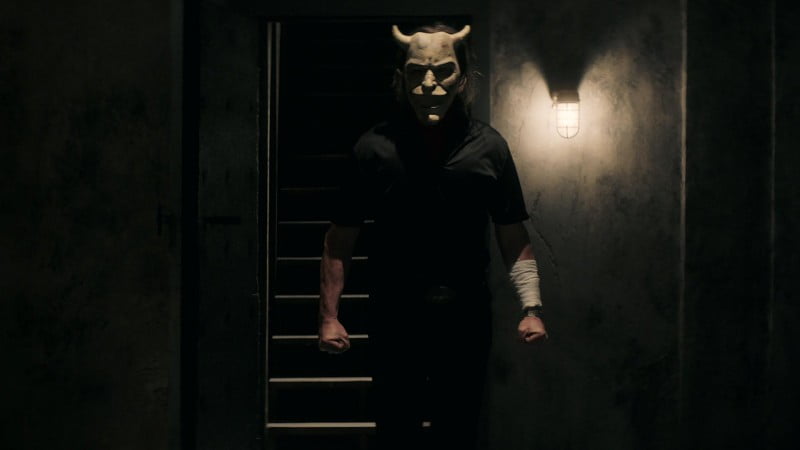The Black Phone creates palpable atmosphere and period authentic aesthetic at the cost of genuine scares. Director Scott Derrickson reteams with his Sinister star Ethan Hawke to deliver a movie you’ll be glad you watched…but inevitably leaves you wanting more.
Reviews of recent movies will not contain spoilers.

The Black Phone
Directed by Scott Derrickson
Screenplay by Scott Derrickson and C. Robert Cargill
Starring Ethan Hawke, Mason Thames, Madeleine McGraw and Jeremy Davies
The Black Phone Review
Movies can provide some of the most lasting impressions of the time period they were filmed in. Whether intentional or not, film cameras record the look and feel of the time. Unless you are over a certain age, movies may provide the only version of the aesthetic of a past time period you’ll ever see. Set in 1978, The Black Phone nails the look of the suburban neighborhood streets of the late 70s. At least, it does, if we base our knowledge of that look on John Carpenter’s Halloween.
Unlike the mostly empty avenues of that 1978 release, the roads of The Black Phone’s Denver suburban setting are filled with people. Unfortunately for them this town has its own monster. Someone known as “The Grabber” is abducting children off the streets. While aesthetically these streets wouldn’t look out of place with Michael Myers walking down them, The Grabber (Ethan Hawke) is a very different type of monster.
Bullied teen Finney (Mason Thames) lives in the town with his abusive, alcoholic father (Jeremy Davies) and his sister Gwen (Madeleine McGraw). Gwen has psychic dreams about The Grabber kidnappings, much to her father’s dismay. After two kids Finney knows are taken by The Grabber and never heard from again, Finney comes across a man with a black van.
Wearing different pieces of masks, The Grabber lures children towards his black van and locks them in his basement. The only things that appear to be in that basement are a mattress, an unreachable barred window, and a disconnected black phone. As Finney begins to process his unwinnable position, the black phone rings.
Based on the short story of the same name by Joe Hill, The Black Phone never quite aims to be a full-on horror movie. What it lacks in scares it makes up for in many other ways. As mentioned, the atmosphere and aesthetic are top notch. Director Scott Derrickson has crafted a believable movie around some supernatural elements. It succeeds at what it intends to be, it just doesn’t intend to keep you up at night.
The performances across the board are great. Hawke must do his work behind various masks and his charismatic performance provides the only true horror in the movie. Thames and McGraw provide top notch showings as the children who must carry most of the scenes. Davies’ troubled father could have easily fallen into caricature without his committed portrayal.
Some people may find scares in the situation the characters find themselves in but mostly you’ll get a well-made story about the effects of, and taking a stand against, abuse. The Black Phone is a dark movie. Finney isn’t abducted into hell from a happy life…he’s moved from one bad situation to a worse one. Between school and home, he lacks the ability to escape from a life of fear and abuse. Now that he’s been taken by The Grabber, he finds that learning to escape is the only option he has if he wants to survive. The previously kidnapped kids are all shown to have been stronger or tougher than Finney…and they couldn’t find their way out. The only chance Finney has may be on the other end of the black phone’s line.
Scare Value
Scott Derrickson creates an engaging and often engrossing movie in The Black Phone. It looks and feels spot on and features great work from its cast of actors. Too often, however, it plays like a straight drama in spite of its more supernatural elements. If the film could have harnessed its atmosphere to ratchet up the scare factor it would have made for a more memorable experience. You might not mind the lack of frights, however, as everything here is very well done.
3.5/5
Rent/Buy on VOD from Amazon.com


